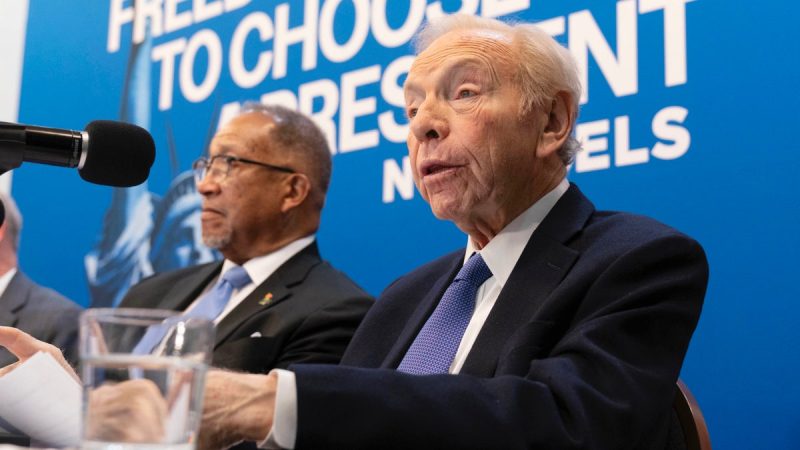No Labels, the influential centrist group that had been working for over a year towards launching a bipartisan, third-party 2024 presidential ticket, is giving up its effort.
The organization on Thursday announced in a statement that ‘No Labels is ending our effort to put forth a Unity ticket in the 2024 presidential election.’
‘Americans remain more open to an independent presidential run and hungrier for unifying national leadership than ever before. But No Labels has always said we would only offer our ballot line to a ticket if we could identify candidates with a credible path to winning the White House. No such candidates emerged, so the responsible course of action is for us to stand down,’ the group explained.
The announcement came a week after the group suffered a major loss with the death of former longtime Sen. Joe Lieberman, the Democratic Party’s 2000 vice presidential nominee and a 2004 presidential candidate who later became an independent and was a No Labels founding co-chair.
In public, Lieberman was a tireless defender of the group’s push for a third-party ticket. And privately, he was a key player in No Labels’ recruitment efforts.
Lieberman also repeatedly emphasized that Americans were anything but enthused about a 2024 rematch between President Biden and former President Donald Trump, and he regularly pushed back against warnings from Democrats that a No Labels ticket would pave a path to victory for Trump in November.
Last month, in announcing the formation of a committee to vet contenders for the potential bipartisan ticket, Lieberman wrote that ‘if No Labels is unable to find candidates who meet this high threshold, then we simply will not offer our ballot line to anyone.’
Hours before Lieberman’s death, former Republican Gov. Chris Christie of New Jersey became the latest high-profile politician to decline to join a 2024 No Labels ticket, along with fellow Republicans in former Maryland Gov. Larry Hogan and Georgia Gov. Brian Kemp, and moderate Democratic Sen. Joe Manchin of West Virginia.
There was also plenty of speculation that former U.N. ambassador and former South Carolina Gov. Nikki Haley, who was the final 2024 GOP presidential nomination rival to Trump before she ended her White House run earlier this month, would consider running on a No Labels ticket. No Labels had expressed interest in her earlier this year.
But Haley repeatedly nixed joining a No Labels ticket, most recently in an interview last month on ‘FOX and Friends.’
New Hampshire Gov. Chris Sununu, another vocal GOP critic of Trump, was also courted. No Labels repeatedly reached out to Sununu and indicated in conversations that he was one of their top choices based on focus group data, a source familiar with those conversations confirmed to Fox News.
‘The Governor politely entertained their appeals, and indicated at numerous stages throughout the conversations that he had no interest in serving on their ticket. They reached out again at the beginning of March, and he once again told them no,’ the source said.
Complicating No Labels efforts was independent presidential candidate Robert F. Kennedy, Jr.
The longtime environmental activist and high-profile vaccine skeptic who is the scion of the nation’s most storied political dynasty is grabbing plenty of attention as he polls higher than any other third-party White House contender since Ross Perot over three decades ago.
Despite the announcement, No Labels continues its mission of obtaining ballot access across the country. The group on Thursday announced that it has officially qualified for the ballot in 21 states.
‘Having gained ballot access in 21 states and spurred a national conversation on the need for another choice in politics, No Labels is excited to build on our momentum to continue pursuing big ideas that promote unity and give voice to America’s commonsense majority,’ the group said in its statement.
And No Labels pledged that ‘we will remain engaged over the next year during what is likely to be the most divisive presidential election of our lifetimes. We will promote dialogue around major policy challenges and call out both sides when they speak and act in bad faith.’

